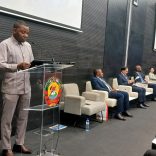Mozambique: Daewoo interested in investing in natural gas projects in the Rovuma basin
Mining must transform relationships – Analysis

Sunday Times / Sikhosiphi Rhadebe speaks with members of the community in Xolobeni, in the Eastern Cape, South Africa. Rhadebe was chairman of the Amadiba Crisis Committee when he was assassinated in March.
As SA’s water and food security crises escalate, good relationships between business and local communities, particularly in the extractive industry, are going to become crucial.
Competition for scarce natural resources is likely to increase and this will translate into more instances of communities in conflict with business, whose operations put still greater strain on the environment on which they depend.
The recent assassination of Wild Coast local community leader and environmental activist Sikhosiphi Rhadebe is an example of what can happen if companies disregard the groups and individuals affected by their operations.
Rhadebe had for more than a decade opposed an Australian developer’s bid to mine titanium on 22km of pristine Wild Coast mineral sand beaches and dunes close to the Xolobeni settlement, as well as plans to build a limited-access freeway.
The mining company — Perth’s Mineral Commodities — denies any involvement in Rhadebe’s killing, but this has done little to dampen speculation that his activism was in some way to blame for his death.
According to the Shared Value Initiative, a global community of leaders who find business opportunities in addressing societal challenges, this is not an isolated incident.
An EU-funded atlas of 600 international mining and oil companies published in 2015 identified more than 1,500 ongoing conflicts raging over water, land, spills, pollution, ill-health, relocations, waste, land grabs, floods, and falling water levels.
The conflicts cost oil and gas and mining companies billions each year.
Research analyst Khanya Mncwabe wrote in the Mail & Guardian recently that companies’ profits were compromised by the negative effect of mining on human rights. She estimates that the South African mining industry lost R15bn in the period just before and after the Marikana massacre. Legal challenges to and community protests about mining operations cost companies $20m globally every week in delays, she says.
In a resource-constrained world, business has more to gain by working with — rather than against — communities and the natural environment on which they depend.
And forward-thinking companies are starting to shift in this direction.
Anglo American CEO Mark Cutifani, quoted in TIME magazine’s special supplement Shifting the Paradigm during WEF 2016, said: “As miners, we need to make sure that what we do makes a positive difference to the people affected by our operations and helps them maintain a meaningful existence.”
There is growing international recognition, too, that indigenous peoples — who inhabit an estimated 20% of the earth’s surface in areas that are environmentally rich in resources — have distinct rights, particularly in relation to what happens on their traditional lands.
In September 2007, the UN General Assembly adopted the Declaration on the Rights of Indigenous Peoples, which spells out the requirement for states to consult and co-operate in good faith with indigenous peoples through their own representative institutions to obtain their free, prior, and informed consent before any development or resource use on ancestral land or within an indigenous populations’s territory.
In 2011, the UN Human Rights Council took this one step further by proposing Guiding Principles on Business and Human Rights, which refers to the obligation on companies to respect human rights.
And in 2013, the International Council on Mining and Metals Council of CEOs approved an Indigenous Peoples and Mining Position Statement, which agreed that appropriate engagement and consultation processes with potentially affected indigenous peoples and relevant government authorities must take place “as early as possible during the project planning, to ensure the meaningful participation of indigenous peoples in decision making”.
So how can organisations build more inclusive operations that respect and enshrine these obligations? It can be done by changing the behaviours of individuals within the company through education and practice, and by building a portfolio of strategic programmes with a long-term economic development strategy.
Organisations need to integrate social investment into their processes, and social performance needs to be incorporated into compensation packages. Business should go about measuring investments in communities by both societal and business outcomes.
Graça Machel reminds us that it is about multistakeholder engagement to ensure all community leaders are consulted.
There must be a more strategic dialogue between mining companies and society, governments, investors, and the communities that supported mines, she said at the 2015 Cape Town Mining Indaba’s programme on sustainable development. Companies should seek to build partnerships with the government, nongovernment organisations, and other companies to address social and environmental challenges, she added.
This is a core strategic element of the company — not something to be outsourced. The industry needs more voices who lead from the front in developing a strategic and ethical response to this situation.
What is crucial for a sustainable future is an understanding that the economy depends on a flourishing society, and both are dependent on a functioning ecosystem.
As Machel eloquently put it: “All of us have to think of a world in which we (don’t) allow our fellow citizens to starve and die … and mining companies need to see how can we contribute to this.
“We’re not talking about profit and growth only. We’re talking about sustained growth.”
By: Elspeth Donovan
• Donovan is the deputy director of the Cambridge Institute for Sustainability Leadership, SA office, and convenes a course on strategic social engagement practice at the UCT Graduate School of Business













Leave a Reply
Be the First to Comment!
You must be logged in to post a comment.
You must be logged in to post a comment.